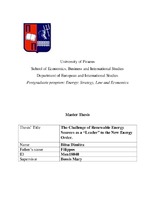The challenge of renewable energy sources as a leader to the New Energy Order

Master Thesis
Συγγραφέας
Μπίτσα, Δήμητρα
Bitsa, Dimitra
Ημερομηνία
2019-12-07Επιβλέπων
Μπόση, ΜαρίαBossi, Mary
Προβολή/
Λέξεις κλειδιά
Renewables ; Transition ; Energy security ; Geopolitics of energy ; Rare earth elementsΠερίληψη
The main purpose of this thesis is to analyze the energy transition that is taking place, in which renewable energy sources, energy efficiency and electrification had the leading roles. These three variables can be analyzed separately, but also, as a threefold function.
The energy transition of renewables promotes the gradual release from fossil fuels dependency. This radical change in the way energy is produced and consumed reappraises the relationship between the human and the environment to a more sustainable one. At the same time, it is emphasized that sustainable and innovative growth will not be destructive for the environment, thus achieving a viable conflation between the two.
Howbeit, the expansion of renewables has increased the demand for rare earth elements, which thanks of their unique properties are indispensable in the construction of the renewables facilities. This evolution, in its turn, creates new challenges for the international community by redefining the geopolitics of energy and underlying, once more, the dependency of human civilization on the natural resources. Hence, the greatest bet for the humankind nowadays is to accomplish the sustainable exploitation of natural resources, in regard of non-exhaustion and preservation of intergenerational right on them.
The politicization of natural resources is not a new political practice of states. The international incidents of the last two decades have confirmed similar practices on the issues of rare earths. In this under transition international energy system, the resources balances are rising in the forefront of the political chessboard, again.
A systematic study of international bibliography was conducted to carry out this research. Particular attention was paid to the study of reports by international organizations, using their conclusions as key milestones. The resolutions of the European Commission and the World Trade Organizations as well as the texts of international agreements constituted the main sources of the primary bibliographical references used. The detailed and multi-dimensional papers by eminent scholars, as well as the articles from reputable online sources have provided an integrated view of the existing knowledge, contributing to further research on the issue under consideration.
The structure of this thesis is organized as follows: the first chapter consists of a brief outline of the historical perspective of energy transition as an eternal process in the history of humanity. Additionally, the importance of energy transition is delineated based on contemporary developments, along with the demand of international community and the new challenges. For the better understanding of the process of energy transition, the states are categorized in five different groups according to their general common characteristics.
In the second chapter a comprehensive analysis of Renewable energy sources is made regarding the stages of their appearance and their gradual expansion and use; the reasons that compel nowadays their widespread use and prevalence in national energy mixes; and finally the geopolitical dimensions of their extensive use.
The third and last chapter is devoted to the analysis of the issue of rare earth elements and specifically to their security and insecurity implications for international community, in an attempt to capture the challenge of renewable energy sources as a leader to the New Energy Order. In the first part, a brief introduction is made to the discovery of the rare earth elements and their importance gradually acquired initially by the academic community and later by the industrial sector. In the second part is studied deeply the geopolitics of rare earth analyzed in four basic dimensions: starting the debate on the question of comparing the fossil fuels and rare earths is highlighted their significance as critical elements, giving the baton to an in-depth analysis of a potential supply risk. The danger of a supply risk arises further discussion for possible solutions to cope with, highlighting the dilemma between the solutions of substitutes or recycling elements, or even a possible combination of both of them. Finally, the analysis of geopolitical dimensions of rare earth is completed with the confrontation of China and all the other players in the international agenda, in an attempt to be outlined the balance of power, the new energy rearrangements and the possible challenges and threats of the next day.

